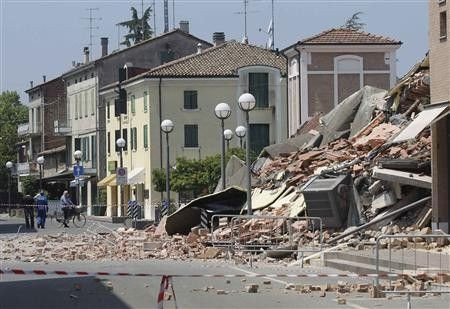Earthquake In Northern Italy Linked To Earlier Quake; Geophysicist Blames Stress Along Faults In Italian Region

The most recent earthquake to hit northern Italy occurred on Tuesday, May 29, in the morning. The 5.8 magnitude quake struck the Modena Province, which is about 11 miles away from the epicenter of a previous earthquake that hit just nine days earlier.
While the May 29 quake rattled the northern region of Italy at 9 a.m. local time (3 a.m. EDT), it is the largest one out of a series of quakes that have shaken the region since the deadly magnitude-6.0 earthquake that sent piles of debris crashing down onto the streets, destroying historic buildings and taking the lives of seven individuals.
Northern Italy's most recent shake-up claimed 15 human lives and has reportedly trapped several more. But while the series of earthquakes might seem coincidental, they could turn out to be linked to each other, according Julie Dutton, a geophysicist with the U.S. Geological Survey.
There are so many different factors that it's difficult to pinpoint why there were more deaths in this particular earthquake, Dutton told OurAmazingPlanet.
Dutton goes on to describe how Tuesday's quake could be the result of changes in stress along the faults in the region -- something that could have been caused by the earlier, larger earthquake.
Because it's not exactly in the same area, we're not calling it an aftershock, but that doesn't mean the two earthquakes are not related, she added.
According to quake reports, both instances are being classified as Thrust Earthquakes -- quakes that are caused by the collision of two tectonic plates.
In this case, the African plate is plowing slowly northward and crashing into the Eurasian plate, along the sole of Italy's boot.
While the northern region of Italy is known to have a long history of earthquakes, the Tuesday morning occurrence was fairly shallow -- about 10 miles (6 km) deep, which is not unusual, according to Dutton.
The most powerful quake to hit Italy in decades occurred in 2009, in central Italy, near Rome. The magnitude-6.3 earthquake struck the city of L'Aquila, killing close to 300 people and causing extensive damage to the surrounding area.
Dutton told OurAmazingPlanet that Italy should expect more earthquakes.
We can't predict earthquakes, Dutton said, the possibility is definitely there, so people should be aware.
© Copyright IBTimes 2024. All rights reserved.






















